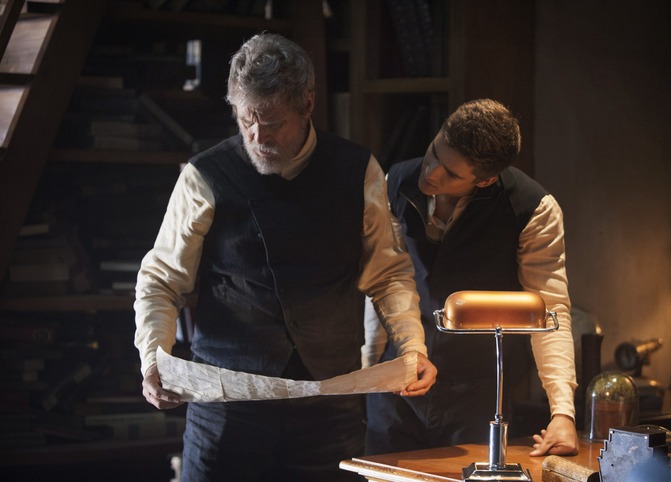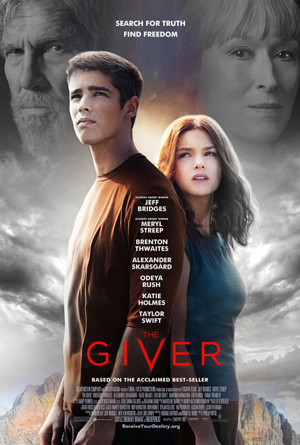
Initially Fascinating Giver Runs Out of Insights
There’s a reason it’s taken about two decades for someone to make a movie out of Lois Lowry’s best-selling piece of young adult fiction The Giver. On the surface this futuristic morality tale set in a dystopian land where emotions have been muted and all color has literally been erased from existence doesn’t scream as being anything too complex or original, but digging into the prose one quickly discovers that initial observation is anything but true. Complex, intelligent, filled with themes and ideas that are universal in both power and importance, the book is a series of frank, unsentimental yet emotionally overpowering discussions between pupil and teacher chronicling the world’s virtues, evils and everything in-between in remarkably exacting detail.
In other words, The Hunger Games this is not. Heck, it’s not even Divergent (even though that Veronica Roth trilogy owes a gigantic debt to Lowry’s novel), this story not exactly filled with action, pyrotechnics, love triangles or anything overtly spectacular. Yes, revolution does play a part in the outcome, but getting there is hardly as startling or as filled with adrenaline as one might presuppose, the whole thing more My Dinner with Andre meets 1984 than it is Star Wars crossed with The Never-Ending Story.
Thus there have been some noticeable changes from the source material, the chief amongst them being the aging up of the protagonist, curious student Jonas (Brenton Thwaites), from 12 to 17. Also added in is something of mild love triangle (not that any of the central characters know exactly what ‘love’ is, per se) between him and fellow teenagers Fiona (Odeya Rush) and Asher (Cameron Monaghan), while the last third is devoted to a frenetic chase sequence juxtaposed with a moralistic conversation both of which are a little on the heavy-handed side of the equation.
But the main thrust remains the same, the crux of the narrative revolving around Jonas being given his adult profession becoming his community’s new ‘Receiver of Memory,’ a highly esteemed position of great authority and significance. He quickly learns, however, that this job isn’t anything close to what he thought it would be, the man responsible for instructing him, nicknamed ‘The Giver’ (Jeff Bridges), showing him facets of a world long destroyed he can barely comprehend. Jonas quickly surmises that a world without emotion, without color, without choice, without free will, is one that will never be fulfilling,
And that portion of the film works. Beautifully, in point of fact, director Phillip Noyce (Patriot Games, Rabbit-Proof Fence) doing a splendid job empowering the scenes between Bridges and Thwaites giving them a palpable sense of inherent realism I found invigorating. The juxtaposition between a (literally) black and white world and a past history filled with color, tears, blood, suffering and triumph is startling, the themes at the center of Lowry’s source material popping off the screen. There is a sense of discovery that gives the proceedings a literary, almost theatrical quality that I responded to whole-heartedly.
It’s when Jonas is forced to spring into action that things begin to lose their focus, the script by Michael Mitnick having trouble maintaining fidelity to the source material in ways that don’t feel didactic and overtly melodramatic. As good as everyone is, and Bridges, Thwaites and Meryl Streep (playing the community’s omnipotent Chief Elder, deathly fearful of what young Jonas has in store for the only world she’s ever known) are all terrific, that doesn’t make the last third less bombastic or clumsy, the ham-fisted nature of the emotions being presented never coalescing in ways I found genuine.
In honesty, none of this hits me as too gigantic a surprise. The nuances of Lowry’s book, the way it bends and weaves with such poetic eloquence, the way it works primarily on a decidedly interior level, none of these are facets that make for an easy adaptation from page to screen. There’s nothing inherently cinematic about the way the author presents her climactic revolution and yet everything that happens in those last chapters is breathlessly exciting and powerfully emotional. A movie trying to showcase any of that visually was always going to have more than its fair share of trouble, so the fact Noyce and company don’t quite figure it out wasn’t a shock.
But it is unfortunate. As low-tech and old school as much of the presentation might be (there’s a decided ‘80s sheen reminiscent of stuff like The Last Starfighter and Flight of the Navigator oozing all over this) it fits the material beautifully. More than that, Noyce has a decided knack for making scenes filled with nothing more than page upon page of dialogue between two characters feel thrilling and active, the director allowing his actors room to roam, breath and create giving their discussion an brisk vibrancy that’s quietly entrancing.
So when it begins to lag, dwell too much in the more obviously sentimental aspects of its narrative, The Giver can’t help but be frustrating. For a good two-thirds I was far more invested in what was going on and why than I had anticipated, and I can honestly say the simple beauty of the initial bits had me close to convinced Noyce and company had figured out the path to allow Lowry’s work to transition to the silver screen. But that’s sadly just not so, and as good as The Giver is initially the sour taste left by the final act is just too foul to easily get beyond.
Film Rating: 2.5 out of 4








